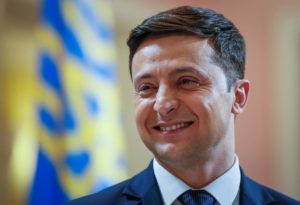
Ukrainian President Volodymyr Zelensky has voiced the opinion that all incumbent heads of regional state administrations in Ukraine should be replaced.
“The president’s position is the following: all the heads of the regional state administrations must be dismissed,” presidential press secretary Yulia Mendel said at a briefing on Monday.
As it was reported, on June 5, Ukraine’s Cabinet of Ministers endorsed the president’s draft resolutions on the dismissal of 13 regional governors.

Scatec Solar in early June signed an agreement with the Dutch development bank FMO to sell a 40% stake in the project of building the Kamyanka solar power station with a capacity of 32 MW in Cherkasy region, the company’s press service has reported.
According to its data, the project with a total cost of EUR35 million is 70% financed by a loan from the European Bank for Reconstruction and Development (EBRD), the rest was issued by FMO.
According to the project, Scatec Solar is also a supplier of design, procurement and construction services and will provide services for its operation and maintenance, as well as asset management, the report says.
As reported, Scatec Solar plans to build about 400 MW solar plants in Ukraine in 2019.

Ukraine has agreed on the veterinary certificates for exporting livestock products to Qatar, the press service of the State Service of Ukraine for Food Safety and Consumers’ Rights Protection has reported. According to the report, the states approved the forms of certificates for exporting meat and meat products (in particular, poultry and beef), milk and dairy products, shell eggs and egg products, fish and fish products, as well as processed food from Ukraine to Qatar.
As reported, Ukraine agreed on certificates for the export of dairy products to Bosnia and Herzegovina and to Oman, as well as for the export of beef to Saudi Arabia.
In 2018, Ukraine opened 85 export markets for various types of products and increased the number of enterprises that received the right to export food products of animal origin. A total of 126 producers of the country can export food products to EU countries.
EXPORTING, LIVESTOCK PRODUCTS, QATAR, VETERINARY CERTIFICATES

The American Chamber of Commerce in Ukraine represents the biggest investors and largest multinationals operating in Ukraine which contribute greatly to the state budget and create jobs at home. In April 2019, the following companies joined AmCham Ukraine family:
Burda Ukraine
The Burda Media Company is a subsidiary of the international concern Hubert Burda Media and owns more than 45 brands with a total coverage of 4 million in print and 2.5 million online. Among them are “Marie Claire”, “Playboy”, “Lisa”, “Rest!”, “Burda Style”, “Good Tips”, “My Child”, “Autosvit”, “The Ideas of Your Home”, “I Love Cooking” , “My Beautiful Garden”, “Grandma’s Compote” and “House in the Garden”, on-line projects “Na-proby” and GLAM.
Andriy Vdovychenko, CEO:
“I find AmCham Ukraine a great platform not only for communicating with people from different companies, but also for dialogue with government officials. The workshops and trainings organized here are a great tool for the development of our employees. I hope that our membership gives our company the opportunity not only to protect business interests, but also to expand its business in Ukraine through new contacts and ideas.”
Allergan Ukraine LLC
Allergan is a bold, global pharmaceutical company. Allergan is focused on developing, manufacturing and commercializing branded pharmaceutical, device, biologic, surgical and regenerative medicine products for patients around the world.
Oleksandr Uskov, CEO:
“The American Chamber of Commerce in Ukraine is the leading platform for communication between companies within our industry, among other industries and all stakeholders in Ukraine. We are looking forward to new opportunities for improving dialogue with state authorities and public figures“.
Arсhimed
Arсhimed is a service company, authorized importer to Ukraine of medical devices and other products for healthcare manufactured by Hartmann AG. Arсhimed provide sales representative services and expert support for the full product life cycle on Ukrainian market.
Nickolay Romanok, CEO:
“During the process of overcoming the peculiarities of the regulatory environment of our country we need transparent communication with government and business community. I consider that AmCham Ukraine will become as effective platform for these aims.”
Accountor
Accountor started working in Ukraine in 2008 as a provider of business processes outsourcing. The company is a part of Accountor Group, the largest financial and HR services group of companies in Northern Europe. Our clients can focus on developing their business while we take care of their bookkeeping and ensure legal support.
Timo Matinpalo, CEO:
“We are happy to be a part of AmCham Ukraine. To provide high-quality business support means to constantly improve your knowledge, to be the first to learn about legislative changes and market innovations, and to respond to customer needs. Thus, AmCham enables companies to share their knowledge and experience about the challenges and opportunities businesses face today.”
KNESS Group, LLC
KNESS is Ukrainian group of companies that develop technologies and implement traditional and renewable energy projects, providing the design, construction/reconstruction and commissioning of power facilities as a complete set of activities. Recently company became one of the first to become an open list of reliable contractors in Ukraine, which investors can trust.
Sergey Shakalov, Director:
“Participation in AmCham Ukraine allows you to join the practice of global business leaders, to interact with the international community and expand the opportunities for foreign investment, which gives a powerful impetus to the development of the national market.”
Kreston GCG
Kreston GCG is the Ukrainian representative of Kreston International – one of the world’s largest accounting and consulting firms with over 25,000 professionals in 125 countries around the world. Company is a leading specialist in providing audit, valuation, tax and legal services.
Sergiy Atamas, Managing Partner:
“We are pleased to be a part of AmCham Ukraine and made our choice understanding grand potential of future cooperation. Comparing the activities of the first ten business organizations and communities in Ukraine: the leader is clearly defined by the participants, intensity, openness and usefulness”.
SDM Partners
SDM Partners provides the full range of legal services to domestic and foreign businesses, governmental authorities, international organizations and financial institutions throughout Ukraine.
Dmytro Syrota, Managing Partner
“We are pleased to join the American Chamber of Commerce in Ukraine, the most active and effective business-oriented network in Ukraine, where we will have the opportunity to strengthen the relationship between Ukrainian and American business communities”.
NETWAVE LLC
NETWAVE operates in Ukraine since 2011 and become a specialized network integrator that solves IT tasks of development, implementation, modernization and maintenance of organizations and enterprises corporate information networks and systems.
Yuriy Sуdorenko, Director:
“Our team is very glad to join the Chamber. We want to understand better how IT can help businesses. AmCham Ukraine platform provides great opportunities for communicating with clients and partners, resulting in a mutually beneficial result. Networking, presentations and other events help to understand customer needs and adapt our business strategy”.
About the American Chamber of Commerce in Ukraine:
The American Chamber of Commerce in Ukraine has been operating in Ukraine since 1992. The Chamber cooperates closely with Ukrainian authorities to improve the business environment and attract foreign investment into the economy, advocates for predictable, transparent, equitable and stable rules of doing business. More information here: http://www.chamber.ua

The Kyivstar mobile communications operator jointly with Alfa Insurance (Kyiv) has launched the online travel insurance service for prepaid and contract subscribers.
The cost of an insurance policy for a seven-day trip will be about UAH 300 (the total cost of the policy depends, among other things, on the exchange rate). At the same time, it is valid in all countries, covering all medical services in case of the need to provide emergency assistance abroad.
The amount for which the subscriber is insured is EUR 30,000. At the same time, prepaid subscribers will receive a bonus of UAH 100 to the account, contract subscribers – an additional 20 minutes in roaming. Bonuses are valid 30 days after the start of the insurance period and only in roaming.
The cost of the policy for 14 days will be about UAH 600, for 21 days – about UAH 950.
The subscriber can receive and pay for the policy online without visiting the company’s office.
Roaming from Kyivstar is available in 195 countries.